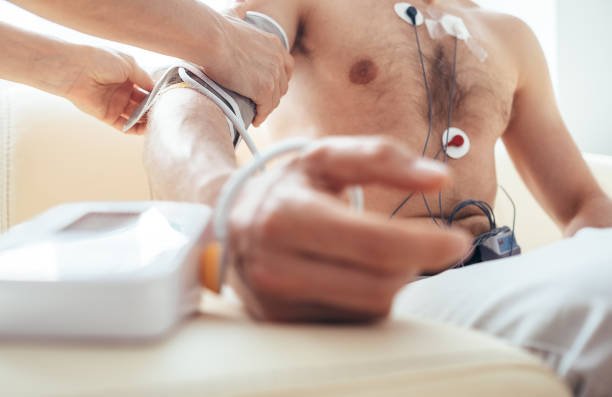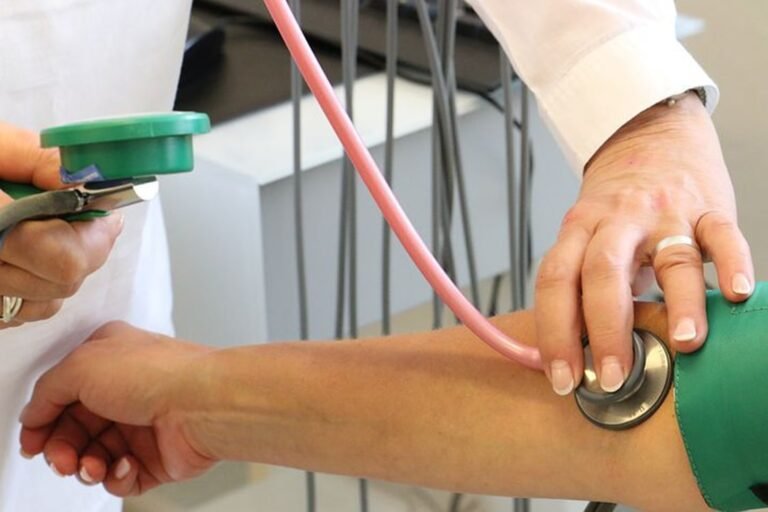The best Holter examination at home in Egypt

At Curexmed we provide the best Holter examination at home in Egypt, to help you check the electrical activity of the heart at home easily without the need to go to the hospital or any specialized center. doctors usually ask for long-term monitoring of electrical activity of the heart, ranging from 24-48 hours, using a heart Holter monitor at home, to help them in diagnosing the main cause behind several symptoms, such as low blood pressure, fainting, dizziness, and diagnosing heart rhythm disturbances.
What is the Holter heart monitor?
The Cardiac Holter monitor is a modern medical device that examines the electrocardiogram and heart activity, including its rhythm and heart rate, for a period ranging from 24-48 hours. It is a small portable device that the patient may carry around his arm or waist. It consists of metal electrodes placed on the chest abdomen areas connected to the Holter device by wires.
The traditional electrocardiogram (ECG) examination is usually used in hospitals or heart clinics to check the heart and its rhythm to diagnose many diseases related to the heart that affects its normal activity, but arrhythmias usually occur in a short period, so it is become hard to record by doctors.
Therefore, there was a need to use a portable heart Holter device to monitor, measure, and record the electrical activity of the heart and its rhythm throughout the day for a period determined by the doctor to enable him to reach the appropriate diagnosis.
The importance of using a 24 hour Holter monitor
- The 24 hour heart monitor is used to check the heartbeat, which coordinates the contraction of the heart muscle and its parts, which maintains the blood flow. Holter used to record:
- electrical activity of the heart and heartbeats.
- heartbeat rhythm (regular or irregular).
- The strength of the electrical impulses.
- timing of electrical impulses.
- At home Holter monitor enables the doctor to check and record the electrocardiogram throughout the day with the different nature of the patient’s activity. As the traditional ECG examination in the hospital or doctor’s office can’t record the nature of the activity of the heart muscle except in a short period (the examination period) in which no abnormality in the activity of the heart may appear.
- Recording the activity of the heart muscle and examining the electrocardiogram during exertion, which may help diagnose diseases related to arrhythmia. The doctor may ask the patient to do some exercise to measure and record the electrocardiogram during exercise, which is difficult to measure when using the traditional electrocardiogram (ECG) examination.
- The 48 hour Holter monitor helps study the effect of medications that your doctor may prescribe to treat heart electrical problems.
- Monitor the pacemaker, and make sure it is working properly.
- Monitoring the patient’s health status after a heart attack.
The role of the ECG Holter monitor in diagnosing heart diseases
A 48 hour heart monitor (Holter) is used to diagnose:
- Chest pain and shortness of breath.
- Symptoms of fainting or dizziness.
- To assess the risk of hypertrophic cardiomyopathy (thickened heart walls) or Wolff-Parkinson-White syndrome.
- Arrhythmia, such as:
- Multifocal atrial tachycardia.
- Atrial fibrillation or flutter.
- Ventricular tachycardia.
- Paroxysmal supraventricular tachycardia.
- slow heart rate (bradycardia).
Using of Holter device
The doctor determines the time needed to use the Holter heart monitor, which is usually 24-48 hours, to closely monitor the activity of the heart:
- The electrodes are small, round patches, are placed on specific areas of the chest and abdomen, and glued with tape.
- Connecting the electrodes to the Holter device by wires.
- The patient wears the Holter device around the waist or the arm
- The Holter device is operated to be able to measure and record the electrical signals emitted by the electrodes
- The patient goes about his life and activities normally.
- The doctor may order some exercise to be able to record the heart’s activity during the effort.
- You must record the dates of taking medications and exercising, record the time of occurrence of any symptoms such as dizziness, chest pain, or shortness of breath, and inform the doctor of those records, which have a role in reaching the appropriate diagnosis.
- The doctor analyzes the results stored on the device after spending the specified period.
FAQ?
How can I order a Holter monitor service at home?
Contact Curxmede now by calling us for at home Holter monitor service, as we provide the best service in the fastest time and at the lowest possible price.
What does the Holter monitor cost?
Usually, the cost of a Holter heart monitor from Curexmed varies depending on several factors such as the location of the service requester and the time of requesting the service, but be sure that the price of the Holter heart monitor service from Curexmed is the best price for the best service provided and as soon as possible.
Where can I do the Holter monitor test?
There are many places for Holter monitors, such as hospitals and private heart clinics, but Curexmed is one of the best places to provide Holter heart services at home because we provide our services with the help of the most qualified medical staff and as soon as possible.
What are the risks of a Holter test?
Usually, there are no risks from using a Holter to test the activity of the heart, but some people may develop itching or inflammation of the skin as a result of applying the electrode sticks for a long time, and some may be allergic to some types of plasters used to stick the electrodes.
What do abnormal results of a Holter test mean?
Abnormal findings may represent cardiac arrhythmias such as multifocal atrial tachycardia, atrial fibrillation or flutter, ventricular tachycardia, paroxysmal supraventricular tachycardia, and bradycardia.
Some changes in the electrocardiogram may indicate that the heart is not getting enough oxygen.
What are the normal results of a Holter heart test?
The electrocardiogram measurements differ between rest and exertion, and the normal results of the Holter examination are that there are no changes in the heart rhythm and heart rate.






